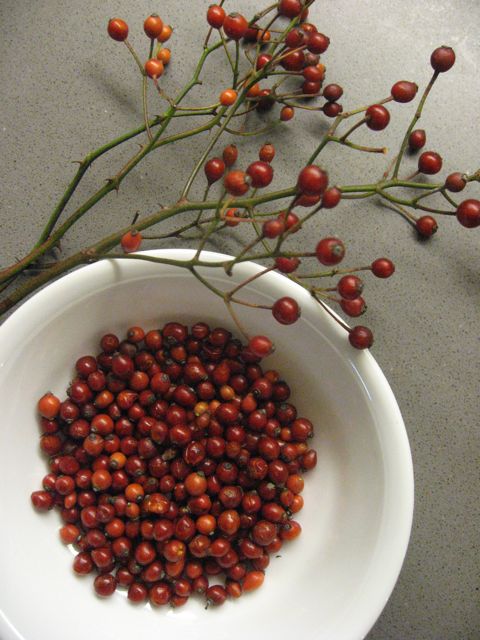I know there’s lots of wild goodness in my backyard, but sometimes it takes a book to send me hunting for it. In this case, that book was How to Make Your Own Drinks.
A prosaic title, yes, but it goes way beyond the usual soak-it-in-vodka routine to offer intriguing advice on turning everything from blackberries and rose petals to gooseberries, dandelions, quince, ginger, apples and even oak leaves into wines, cordials, liqueurs, teas and syrups, both alcoholic and non.

Paging through Susy Atkins’ book set me daydreaming about picking berries and flowers in the woods, but the rain beating on my window reminded me that it’s November. Nothing much out there now, except rose hips, the ruby-colored, vitamin C-packed seed pods produced by roses of all kinds.
We’ve plenty of multiflora rose on our farm, but that isn’t really as nice as it sounds. This wild variety is generally considered a noxious weed, both for its ability to quickly choke out more desirable plants and its nasty little thorns. That said, you can’t get rid of it. So why not put it to good use?
I gathered an experimental ounce of the tiny hips (did I mention the talon-like thorns?), chopped and steeped them and mixed them with sugar. The result? A pale straw-colored syrup, floral with a tart edge. I could dilute it with water to make a cordial for the kiddos, or reduce it into a proper syrup, good for pouring over pancakes or ice cream.
Or, I could just keep adding it to my cocktail shaker, along with vodka and Domaine de Canton ginger liqueur. It makes a refreshing cocktail, although I think I’ll try it with Hendrick’s gin next. And if I run out? There will surely be more roses next year.
Rosehip syrup: Collect 2 pounds of rose hips, trim the stems and beards and wash well. Mince fruits in a blender or food processor, adding water as necessary. Pour 2 quarts plus 1-1/2 pints of boiling water into a pan, add the minced fruit, bring back to a boil and cook for 1-2 minutes. Turn heat off and leave for 15 minutes. Strain through a muslin bag (I used a cheesecloth-lined strainer) and retain the liquid. Put the pulp back into the pan, add 3-3/4 cups hot water and bring to a boil again. Turn off heat and leave for 10 minutes. Strain again, mixing both batches of hot liquid together, and discard pulp. Heat liquid to a simmer and cook until reduced by one-third. Add 1 pound sugar, stir to dissolve and simmer 5 minutes more. Allow to cool, pour into sterilized bottles and seal. Drink within two weeks.